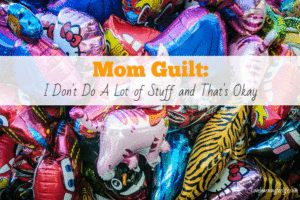Talking to Kids About Tragedy
Even if you shield your kids from the most horrible parts of the news, there is a good chance that sooner or later they’ll hear about it at school. I personally feel that I would be an irresponsible parent if I didn’t discuss tragedies with my children, simply because how else are they going to learn how to process the information? Children need the guidance of their parents to help them understand world events and what they mean for your child personally.
The Columbine school shooting happened while I was in high school. As much as I felt safe in my rural hometown school, it still left me shaken. I had nightmares about a shooter coming into one of my classrooms. In my mind, I started planning escape routes from every room I entered. Another shooting at a college campus happened while I was in college. Suddenly, I started looking at my classrooms and wondering where in the world I would hide if someone came in and started shooting.
I was a mom with a kindergartner and a 3rd grader when the tragedy at Sandy Hook Elementary took place. I, like my many parents I’m sure, had to fight the urge to drive to my kids’ school, pick them up, and never let them leave the house again.
We knew we needed to talk to our girls about what happened. We didn’t want them to get random information from kids at school or hear bits and pieces of information from overheard conversations that didn’t make sense. It was a hard conversation to have. You don’t want your children to be afraid but sometimes what they imagine can be even worse.
Boston, Paris, Orlando – It will keep happening and we have to help our children process what is going on, even if we don’t fully understand it ourselves.
First, I want to provide a few helpful links with information about helping kids through traumatic events:
Talking to Children about Tragedy and Other News Events – Healthyfamily.org
Tips for Talking to Children After a Disaster – Substance Abuse and Mental Health Services Administration
Promoting Adjustment and Helping Children Cope After Disaster and Crisis -American Academy of Pediatrics
National Center for School Crisis and Bereavement – USC School of Social Work
Second, here’s what the experts say about talking to your kids about tragedy (along with my personal input and experience):
Tell Them What Happened
A good way to start out is by asking them what they’ve already heard. That’s almost always how I start with my kids. “So has anyone at school…” or “Have you been hearing anything about…” usually works pretty well. Usually, by the time I ask, they’ve already heard some information but they don’t know what exactly people are talking about.
They need the basics, not the gory details. How and what information you tell them should be based on their age and each individual child. All of my children are prone to nightmares so I try to keep things general and not too vivid. At the same time, I don’t want to make it so vague that have no idea what I’m really talking about.
When I talked to my girls about Sandy Hook, I could see the confusion on their faces. They couldn’t understand why someone would enter a school and hurt children. Did any of us? They kept asking me why someone would do that, which I never could answer well, other than – the man was sick in his mind. In a way that would make him do something that should never be done.
Then, of course, they wondered if something like that could happen at their school. That is when my oldest figured out why they had lock down drills. They asked what the teachers did at Sandy Hook and they wanted to know if their teachers would do that too. I could honestly say that I knew they would, without a shadow of a doubt.
Limit Their Exposure to the News
Yet another reason to limit screen time. The media can present the facts over and over and over again, in far too much detail for a child to handle. There are often images and, sometimes, sounds that can be upsetting for children.
We only have Netflix at our house so this isn’t a problem for us, but if you have the news on for a long length of time, you do hear and watch the same news cycle. Whether or not we realize it, our children are paying attention. Even if they don’t say anything, they are taking in what they see on the news. As parents, we have to be aware of what they can handle and how they are interpreting what they see and hear.
Watch Their Behavior
When it comes to behavioral changes, you know your child best. The symptoms to watch for are:
Sleep Changes: Nightmares, trouble falling or staying asleep, or other sleep problems. These can be normal childhood behaviors but after a tragedy they might mean your child is having trouble processing the information.
Physical Complaints: Headaches, stomachaches, or other complaints about not feeling good could be a sign as well as changes in eating habits.
Changes in Behavior: Changes in their usual patterns, regressive behavior, being more or less demanding than usual amongst others. Teens may begin experimenting in risky behavior.
Emotional Problems: Anxiety, sadness, depression, and fear that is not consistent with their current situation and out of the norm for their personality. Increased separation anxiety is common, especially from their mother, after a fearful event.
I like the resources on HealthyParent.org, especially their page on Talking with Children about Tragedy and Other News Events, which I’ve already linked to once, but it’s my favorite because what to watch for is explained simply and they have other links you can look at if you want more information.
Pay Attention
You know your kids and even if you aren’t entirely sure how to talk to them about tragic events, finding out how they feel about it may help you understand where to begin. I know that sometimes I get so caught up in how I feel about things that I forget my kids might be picking up on my anxiety. Usually, once I’ve talked to them about it and let them know how I’m processing the information, they do a lot better. They are more willing to talk and tell me about their concerns.
Many times, children just need a chance to talk about their feelings. Talking about them sometimes helps them clear their thinking. When in doubt, remember Mr. Rogers:
When I was a boy and I would see scary things in the news, my mother would say to me, ‘Look for the helpers. You will always find people who are helping’. To this day, especially in times of disaster, I remember my mother’s words and I am always comforted by realizing that there are still so many helpers – so many caring people in this world.





Leave a Reply
Share your thoughts.